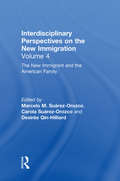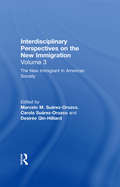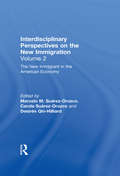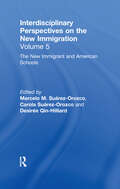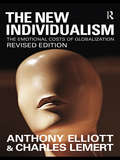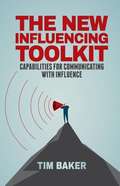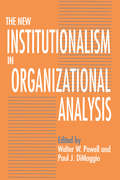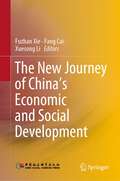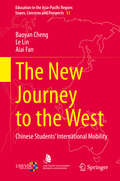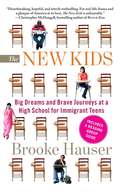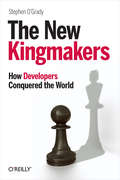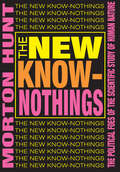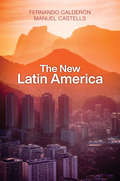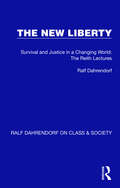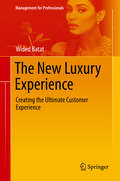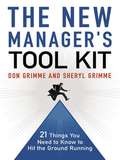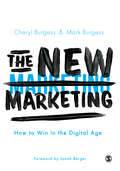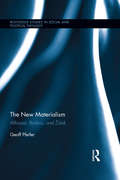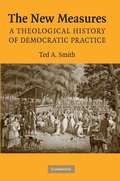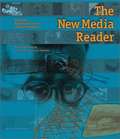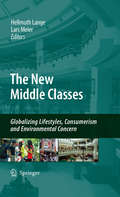- Table View
- List View
The New Immigrant and the American Family: Interdisciplinary Perspectives on the New Immigration
by Marcelo M. Suárez-Orozco Carola Suárez-Orozco Desirée Qin-HilliardFirst Published in 2002. Routledge is an imprint of Taylor & Francis, an informa company.
The New Immigrant in American Society: Interdisciplinary Perspectives on the New Immigration
by Marcelo M. Suárez-Orozco Carola Suárez-Orozco Desirée Qin-HilliardFirst published in 2002. Routledge is an imprint of Taylor & Francis, an informa company.
The New Immigrant in the American Economy: Interdisciplinary Perspectives on the New Immigration
by Marcelo M. Suárez-Orozco Carola Suárez-Orozco Desirée Qin-HilliardFirst Published in 2002. Routledge is an imprint of Taylor & Francis, an informa company.
The New Immigrants and American Schools: Interdisciplinary Perspectives on the New Immigration
by Marcelo M. Suárez-Orozco; Carola Suárez-Orozco; Desirée Qin-HilliardThis six-volume set focuses on Latin American, Caribbean, and Asian immigration, which accounts for nearly 80 percent of all new immigration to the United States. The volumes contain the essential scholarship of the last decade and present key contributions reflecting the major theoretical, empirical, and policy debates about the new immigration. The material addresses vital issues of race, gender, and socioeconomic status as they intersect with the contemporary immigration experience. Organized by theme, each volume stands as an independent contribution to immigration studies, with seminal journal articles and book chapters from hard-to-find sources, comprising the most important literature on the subject. The individual volumes include a brief preface presenting the major themes that emerge in the materials, and a bibliography of further recommended readings. In its coverage of the most influential scholarship on the social, economic, educational, and civil rights issues revolving around new immigration, this collection provides an invaluable resource for students and researchers in a wide range of fields, including contemporary American history, public policy, education, sociology, political science, demographics, immigration law, ESL, linguistics, and more.
The New Individualism: The Emotional Costs of Globalization REVISED EDITION
by Anthony Elliott Prof Charles LemertThis is a new and revised edition of a book which has had a major impact upon the social sciences and public political debate. Anthony Elliott and Charles Lemert's THE NEW INDIVIDUALISM inspired readers with the dramatic suggestion that 'the reinvention craze' - from self-help and therapy culture to management restructurings and corporate downsizings - is central to a 'new individualism' sweeping the globe. Giving particular attention to the narratives of people seeking to define anew their lives in an age of globalization, the authors contend that an endless hunger for instant change and relentless emphasis on self-reinvention is fundamental to grasping the disorientating effects of the new individualism. This edition contains a substantial new Introduction in which Elliott and Lemert reply to some of the standard criticisms made of the theory of the new individualism, and also addresses the escalation of new individualist thinking in the wake of recent global crises.
The New Influencing Toolkit
by Tim BakerWithout influence, managers are ineffective. In today's workplace, managers need to influence up, down and increasingly, sideways as organizations become less hierarchical. This book is expertly designed to diagnose and develop managerial influence, focusing on four key strategies: investigating, calculating, motivating and collaborating.
The New Institutionalism in Organizational Analysis
by Edited by Walter W. Powell Paul J. DimaggioLong a fruitful area of scrutiny for students of organizations, the study of institutions is undergoing a renaissance in contemporary social science. This volume offers, for the first time, both often-cited foundation works and the latest writings of scholars associated with the "institutional" approach to organization analysis. In their introduction, the editors discuss points of convergence and disagreement with institutionally oriented research in economics and political science, and locate the "institutional" approach in relation to major developments in contemporary sociological theory. Several chapters consolidate the theoretical advances of the past decade, identify and clarify the paradigm's key ambiguities, and push the theoretical agenda in novel ways by developing sophisticated arguments about the linkage between institutional patterns and forms of social structure. The empirical studies that follow-involving such diverse topics as mental health clinics, art museums, large corporations, civil-service systems, and national polities-illustrate the explanatory power of institutional theory in the analysis of organizational change. Required reading for anyone interested in the sociology of organizations, the volume should appeal to scholars concerned with culture, political institutions, and social change.
The New Institutionalism in Organizational Analysis
by Walter W. Powell Paul J. DiMaggioLong a fruitful area of scrutiny for students of organizations, the study of institutions is undergoing a renaissance in contemporary social science. This volume offers, for the first time, both often-cited foundation works and the latest writings of scholars associated with the "institutional" approach to organization analysis. In their introduction, the editors discuss points of convergence and disagreement with institutionally oriented research in economics and political science, and locate the "institutional" approach in relation to major developments in contemporary sociological theory. Several chapters consolidate the theoretical advances of the past decade, identify and clarify the paradigm's key ambiguities, and push the theoretical agenda in novel ways by developing sophisticated arguments about the linkage between institutional patterns and forms of social structure. The empirical studies that follow—involving such diverse topics as mental health clinics, art museums, large corporations, civil-service systems, and national polities—illustrate the explanatory power of institutional theory in the analysis of organizational change. Required reading for anyone interested in the sociology of organizations, the volume should appeal to scholars concerned with culture, political institutions, and social change.
The New Journey of China’s Economic and Social Development
by Fang Cai Xuesong Li Fuzhan XieThis book aims at China's economic and social development, which has embarked on a new journey. It collects more than 20 major research achievements of researchers in relevant fields of the Chinese Academy of Social Sciences. These topics cover rural revitalization and anti-poverty, industrialization and manufacturing transformation, service industry upgrading, fiscal and taxation system and fiscal sustainability, major financial reform, industry and competition policy, ownership structure, new pattern of opening up, digital economy, innovation driven, financial stability, macro-control, new urbanization, regional development, ecological environment, aging population, labor market, income distribution, social governance, people's livelihood, social security, the rule of law, cultural power, and other major issues. This book helps people from all walks of life better understand and grasp the new trends, opportunities, and challenges of China's economic and social development in the future and provides useful reference for thinking about China's medium and long-term development strategy and development path.
The New Journey to the West: Chinese Students’ International Mobility (Education in the Asia-Pacific Region: Issues, Concerns and Prospects #53)
by Baoyan Cheng Le Lin Aiai FanThis book provides a comprehensive assessment of the cross-border mobility of Chinese students and addresses the questions of who in China chooses to study overseas, why they want to do so, and what the impacts of this mobility are on China’s social stratification. In addition, it explores the challenges that these students face in terms of adaptation and identity formation once they have arrived in the destination country. Adopting a push-and-pull framework to analyze the data, it offers a unique and insightful resource.
The New Kids
by Brooke HauserSome walked across deserts and mountains to get here. Others flew in on planes. One arrived after escaping in a suitcase. And some won't say how they got here. These are "the new kids": new to America and all the routines and rituals of an American high school, from lonely first days to prom. They attend the International High School at Prospect Heights in Brooklyn, which is like most high schools in some ways--its halls are filled with students gossiping, joking, flirting, and pushing the limits of the school's dress code--but all of the students are recent immigrants learning English. Together, they come from more than forty-five countries and speak more than twenty-eight languages. A singular work of narrative journalism, The New Kids chronicles a year in the life of a remarkable group of these teenage newcomers--a multicultural mosaic that embodies what is truly amazing about America. Hauser's unforgettable portraits include Jessica, kicked out of her father's home just days after arriving from China; Ngawang, who spent twenty-four hours folded up in a small suitcase to escape from Tibet; Mohamed, a diamond miner's son from Sierra Leone whose arrival in New York City is shrouded in mystery; Yasmeen, a recently orphaned Yemeni girl who is torn between pursuing college and marrying so that she can take care of her younger siblings; and Chit Su, a Burmese refugee who is the only person to speak her language in the entire school. The students in this modern-day Babel deal with enormous obstacles: traumas and wars in their countries of origin that haunt them, and pressures from their cultures to marry or to drop out and go to work. They aren't just jostling for their places in the high school pecking order--they are carving out new lives for themselves in America. The New Kids is immersion reporting at its most compelling as Brooke Hauser takes us deep inside the dramas of five International High School students who are at once ordinary and extraordinaryin their separate paths to the American Dream. Readers will be rooting for these kids long after reading the stories of where they came from, how they got here, and where they are going next.
The New Kingmakers: How Developers Conquered the World
by Stephen O'GradyThe New Kingmakers documents the rise of the developer class, and provides strategies for companies to adapt to the new technology landscape. From recruiting to retention, it provides a playbook to work more efficiently and effectively with the most important members of your organization.
The New Know-nothings: The Political Foes of the Scientific Study of Human Nature
by Morton HuntIn recent years, political, religious, and other special-interest groups have waged war on behavioral and social research projects that threaten their interests and values. They have hounded researchers out of universities, cut off their funding through congressional and state legislative pressure, and harassed them with public demonstrations and picketing, all in the hope of forcing them to abandon their research. Formerly such unwanted involvement came from activists on the left. Now it comes from all across the political spectrum, as anti-science attitudes and techniques have diffused throughout society. In addition, conservative and religious forces lobby Congress and state legislatures against funding for major research projects of which they disapprove. This phenomenon represents a grave threat to both scientific freedom and the well-being of modern society.Morton Hunt gives us the first serious overview of this threat to behavioral and social science research. He illustrates precisely how scientific research has been subjected to political attack. The New Know-Nothings illustrates this phenomenon using in-depth case histories and background discussions of the conflicting social forces involved. It considers the prevalence of each form of opposition of research has been subjected to political attack. The New Know-Nothings illustrates this phenomenon using in-depth case histories and background discussions of the conflicting social forces involved. It considers the prevalence of each form of opposition to research, using interviews with expert observers in the sciences and government. Hunt reviews the nature-nurture debate, biological contributions to gender differences, conservative opposition to sex research in the schools, the debate over the controlled drinking approach to alcoholism, animal rights versus scientists' rights to use animals in research, the controversy over day care, anthropological research needs versus the Native American repatriation of re
The New Latin America
by Manuel Castells Fernando CalderonLatin America has experienced a profound transformation in the first two decades of the 21st century: it has been fully incorporated into the global economy, while excluding regions and populations devalued by the logic of capitalism. Technological modernization has gone hand-in-hand with the reshaping of old identities and the emergence of new ones. The transformation of Latin America has been shaped by social movements and political conflicts. The neoliberal model that dominated the first stage of the transformation induced widespread inequality and poverty, and triggered social explosions that led to its own collapse. A new model, neo-developmentalism, emerged from these crises as national populist movements were elected to government in several countries. The more the state intervened in the economy, the more it became vulnerable to corruption, until the rampant criminal economy came to penetrate state institutions. Upper middle classes defending their privileges and citizens indignant because of corruption of the political elites revolted against the new regimes, undermining the model of neo-developmentalism. In the midst of political disaffection and public despair, new social movements, women, youth, indigenous people, workers, peasants, opened up avenues of hope against the background of darkness invading the continent. This book, written by two leading scholars of Latin America, provides a comprehensive and up-do-date account of the new Latin America that is in the process of taking shape today. It will be an indispensable text for students and scholars in Latin American Studies, sociology, politics and media and communication studies, and anyone interested in Latin America today.
The New Legal Realism, Volume I: Translating Law-and-Society for Today's Legal Practice
by Elizabeth Mertz Stewart Macaulay Thomas W. MitchellThis is the first of two volumes announcing the emergence of the new legal realism as a field of study. At a time when the legal academy is turning to social science for new approaches, these volumes chart a new course for interdisciplinary research by synthesizing law on the ground, empirical research, and theory. Volume 1 lays the groundwork for this novel and comprehensive approach with an innovative mix of theoretical, historical, pedagogical, and empirical perspectives. Their empirical work covers such wide-ranging topics as the financial crisis, intellectual property battles, the legal disenfranchisement of African-American landowners, and gender and racial prejudice on law school faculties. The methodological blueprint offered here will be essential for anyone interested in the future of law-and-society. Demonstrates the importance of interdisciplinary translation between law and social sciences Introduces readers to the scholarship of today's leading new legal realists. Shows how new legal realism can provide a broader lens than the empirical legal studies movement.
The New Legal Realism, Volume II: Studying Law Globally
by Sally Engle Merry Heinz KlugThis is the second of two volumes announcing the emergence of the new legal realism. At a time when the legal academy is turning to social science for new approaches, these volumes chart a new course for interdisciplinary research by synthesizing law on the ground, empirical research, and theory. Volume 2 explores the integration of global perspectives and information into our understanding of law. Increasingly, local experiences of law are informed by broader interactions of national, international, and global law. Lawyers, judges, and other legal actors often have to respond to these broader contexts, while those pursuing justice in various global contexts must wrestle with the specific problems of translation that emerge when different concepts of law and local circumstances interact. Using empirical research, the authors in this path-breaking volume shed light on current developments in law at a global level. Demonstrates the importance of interdisciplinary translation between law and social sciences Introduces readers to the scholarship of today's leading new legal realists. Shows how new legal realism can provide a broader lens than the empirical legal studies movement.
The New Liberty: Survival and Justice in a Changing World: The Reith Lectures (Ralf Dahrendorf on Class & Society #4)
by Ralf DahrendorfOriginally published in 1975, Ralf Dahrendorf’s Reith Lectures were an important contribution to public debate, exploring as they do the theme of the new liberty and being concerned to refashion liberalism to cope with the problems and tension of contemporary societies. The analysis covers endemic economic problems, such as growth, inflation and development, the complex nature of organizations, and the problems of political representation.
The New Luxury Experience: Creating the Ultimate Customer Experience (Management for Professionals)
by Wided BatatThis professional book introduces marketing and luxury brand professionals to a new definition of luxury and the art of designing the ultimate luxury experience in both the physical space (e.g., in-store, hotel, restaurant) and the digital space (e.g., social media, website, e-commerce). Specifically, it offers an overview of customer experience issues and explores big five experiential strategies that can be applied by luxury houses in order to provide the best luxury experience to their customers. Themes such as quality of customer luxury experience, immersion and co-production/co-creation in luxury, creation and management, digital and immersive marketing, and innovative market research are also examined. How do consumers define luxury? Is there one luxury or several “luxuries”? What kind of luxury experiences consumers want to live? How can luxury houses design the ultimate luxury experience? More than in any other sector, luxury consumption is a response to a search for emotions, pleasure, uniqueness, consideration and greatest services. The luxury consumer wants to live luxury experiences – not just buy luxury products or services. In this way, this book presents the luxury consumption experience as a combination of symbolic meaning, subconscious processes and nonverbal cues and characterized by fantasies, feelings and fun. Featuring case studies and interviews from international luxury sectors and brand managers such as Burberry, Dior, Porsche, Breitling, St. Regis Hotels & Resorts, and Louis Vuitton, among others, this book offers both a research and management perspective on luxury experience to professionals in the luxury sector (e.g., CEOs, brand managers, marketing and communication professionals), as well as marketing professors, students, and people eager to learn more about how to design the ultimate luxury experience. Praise for The New Luxury Experience “This book provides a holistic perspective on marketing of luxury brands, offering both useful practical advice as well as illustrating important cases.” -- Ravi Dhar, Director, Yale Center for Customer Insights, Yale University “Wided Batat’s book offers a fresh, insightful and comprehensive analysis of the concept of the consumer’s experience with luxury whatever that may be. The Five experiential luxury strategies proposed by Wided highlight that luxury management should go above and beyond the design and branding of luxury goods and services. I also commend the consideration given to the younger generations’ approach to luxury and to corporate social responsibility aspects. Luxury marketers should find this book very useful indeed.” -- Francesca Dall’Olmo Riley, Professor of Brand Management, Kingston Business School, UK
The New Manager's Tool Kit: 21 Things You Need to Know to Hit the Ground Running
by Don Grimme Sheryl GrimmeIn this helpful guidebook, authors Don and Sheryl Grimme provide a fresh, friendly approach to tackling the challenges of management and leveraging your new position to help your organization succeed.Novice managers have their work cut out for them: all new skills to learn, different personalities to deal with, and greater responsibilities to fulfill. The New Manager's Tool Kit provides you with fast, powerful lessons to help them:increase productivity;unlock hidden talent;work with different types of people;communicate effectively;diagnose problems;coach both good and problematic employees;encourage teamwork;avoid burnout;eliminate conflict;and nurture the next generation of managers.With lessons covering both basic management skills as well as more advanced leadership tactics and bonus tips to help managers overcome the most difficult leadership challenges, The New Manager's Tool Kit provides those charged with managing and leading others the tools and real-world knowledge they need to succeed and open themselves up for further advancement.
The New Marketing: How to Win in the Digital Age
by Mark Burgess Cheryl BurgessIn our hyper-connected world that is changing at warp speed, marketers recognize the need to shift from traditional marketing methods to a new way that can help them better navigate the unpredictable environment. For traditionalists, this change has posed a challenge. Many have tried to incorporate new approaches into the old models they grew up with, only to be frustrated with the results. From the bestselling authors of The Social Employee, and LinkedIn Learning course authors, comes a powerful new textbook that cracks the marketing code in our hyper-focused digital age. The New Marketing, with contributions spanning CMO trailblazers to martech disruptors, behavioral economics luminaries at Yale to leading marketing thinkers at Kellogg and Wharton, is a GPS for navigating in a digital world and moves the craft of marketing through the forces of marketing transformation. We can’t predict the future. But our goal is to help make Masters/MBA students and marketing practitioners future-ready and successful.
The New Marketing: How to Win in the Digital Age
by Mark Burgess Cheryl BurgessIn our hyper-connected world that is changing at warp speed, marketers recognize the need to shift from traditional marketing methods to a new way that can help them better navigate the unpredictable environment. For traditionalists, this change has posed a challenge. Many have tried to incorporate new approaches into the old models they grew up with, only to be frustrated with the results. From the bestselling authors of The Social Employee, and LinkedIn Learning course authors, comes a powerful new textbook that cracks the marketing code in our hyper-focused digital age. The New Marketing, with contributions spanning CMO trailblazers to martech disruptors, behavioral economics luminaries at Yale to leading marketing thinkers at Kellogg and Wharton, is a GPS for navigating in a digital world and moves the craft of marketing through the forces of marketing transformation. We can’t predict the future. But our goal is to help make Masters/MBA students and marketing practitioners future-ready and successful.
The New Materialism: Althusser, Badiou, and Žižek (Routledge Studies in Social and Political Thought #102)
by Geoff PfeiferAlain Badiou and Slavoj Žižek have become two of the dominant voices in contemporary philosophy and critical theory. In this book, Geoff Pfeifer offers an in-depth look at their respective views. Using Louis Althusser’s materialism as a starting point—which, as Pfeifer shows, was built partially as a response to the Marxism of the Parti Communiste Français and partially in dialogue with other philosophical movements and intellectual currents of its times—the book looks at the differing ways in which both Badiou’s and Žižek’s work attempt to respond to issues that arise within the Althusserian edifice. Pfeifer argues here that, ultimately, Žižek’s materialism succeeds in responding to these issues in ways that Badiou’s does not. In building this argument, Pfeifer engages not only with the work of Althusser, Badiou, and Žižek and their intellectual backgrounds, but also with much of the contemporary scholarship surrounding these thinkers. As such, Pfeifer’s book is an important addition to the ongoing debates within contemporary critical theory.
The New Measures: A Theological History of Democratic Practice
by Ted A. SmithCombining histories of performance, space, institutions, and ideas, the book tells the story of the 'new measures' that circulated in the religious revivals of the 1820s and '30s.
The New Media Reader
by Nick Montfort Noah Wardrip-FruinThis reader collects the texts, videos, and computer programs--many of them now almost impossible to find--that chronicle the history and form the foundation of the still-emerging field of new media. General introductions by Janet Murray and Lev Manovich, along with short introductions to each of the texts, place the works in their historical context and explain their significance. The texts were originally published between World War II--when digital computing, cybernetic feedback, and early notions of hypertext and the Internet first appeared--and the emergence of the World Wide Web--when they entered the mainstream of public life. The texts are by computer scientists, artists, architects, literary writers, interface designers, cultural critics, and individuals working across disciplines. The contributors include (chronologically) Jorge Luis Borges, Vannevar Bush, Alan Turing, Ivan Sutherland, William S. Burroughs, Ted Nelson, Italo Calvino, Marshall McLuhan, Billy Kl?Jean Baudrillard, Nicholas Negroponte, Alan Kay, Bill Viola, Sherry Turkle, Richard Stallman, Brenda Laurel, Langdon Winner, Robert Coover, and Tim Berners-Lee. The CD accompanying the book contains examples of early games, digital art, independent literary efforts, software created at universities, and home-computer commercial software. Also on the CD is digitized video, documenting new media programs and artwork for which no operational version exists. One example is a video record of Douglas Engelbart's first presentation of the mouse, word processor, hyperlink, computer-supported cooperative work, video conferencing, and the dividing up of the screen we now call non-overlapping windows; another is documentation of Lynn Hershman's Lorna, the first interactive video art installation.
The New Middle Classes
by Hellmuth Lange Lars MeierThe new middle classes of developing countries are held responsible for boosting extremely resource-intensive lifestyles beyond the OECD-world thus thwarting ongoing efforts to attain a more sustainable future. But how homogeneous are their consumption patterns and why should not globalization include the extension of environmental concern, too? "The New Middle Classes" challenges a narrow understanding of lifestyles and consumption by analyzing the issue not only in terms of attitudes and preferences but of socio-economic features and governmental policies, too.
